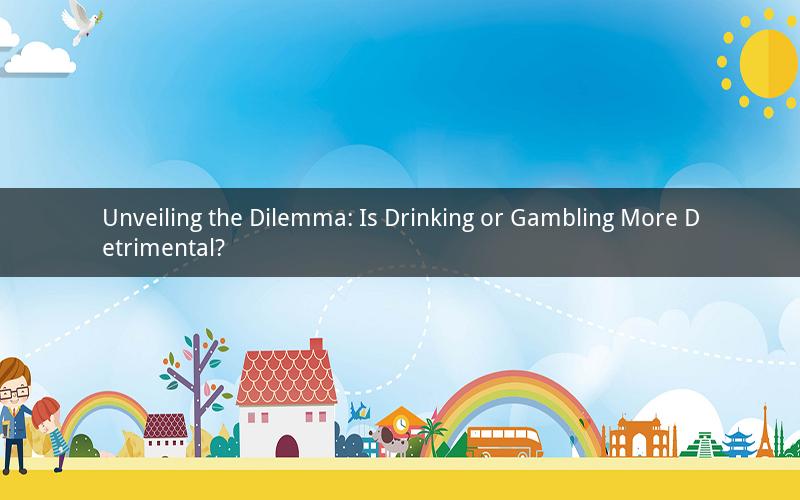
Drinking and gambling, both activities often criticized and stigmatized, have been long-debated on their impact on individuals and society. Despite their distinct characteristics, some argue that one is more harmful than the other. In this article, we will explore the potential consequences of both drinking and gambling, analyze their severity, and provide a well-informed perspective on which is worse.
1. Alcohol Consumption
Drinking, especially excessive alcohol consumption, can have profound negative effects on physical and mental health. Chronic drinking may lead to a variety of health problems, including liver disease, cardiovascular issues, and certain types of cancer. Additionally, drinking can result in an increased risk of accidents, violence, and interpersonal conflicts.
a. Health Issues: Excessive alcohol consumption can damage vital organs such as the liver, pancreas, and heart. This may lead to diseases such as alcoholic hepatitis, cirrhosis, pancreatitis, and hypertension. Furthermore, it can weaken the immune system, making individuals more susceptible to infections.
b. Psychological Consequences: Alcohol abuse is linked to mental health disorders such as depression, anxiety, and alcohol dependence. Individuals struggling with addiction may experience intense cravings, withdrawal symptoms, and difficulties in maintaining relationships.
2. Gambling
Gambling, on the other hand, is often considered a form of entertainment, but it can also be highly addictive and lead to significant negative consequences. Problem gambling can result in financial difficulties, strained relationships, and even mental health issues.
a. Financial Strain: Gamblers, particularly those with problem gambling, may suffer from significant financial loss. This can lead to debt, loss of property, and even bankruptcy.
b. Relationships and Family: Problem gamblers often experience strained relationships with family and friends due to their gambling addiction. Lying, stealing, and neglecting responsibilities can result in emotional and social consequences for both the gambler and their loved ones.
Comparing the Harms
Determining which is worse, drinking or gambling, is not a straightforward task. Both activities carry their own set of risks and potential consequences. However, we can analyze certain factors to shed light on this debate.
1. Health Risks
From a health perspective, drinking tends to have more immediate and severe health consequences compared to gambling. Chronic drinking can lead to organ damage and an increased risk of cancer, whereas problem gambling, although linked to mental health issues, may not result in the same level of physical harm.
2. Psychological Impact
The psychological impact of both drinking and gambling is significant, but drinking can often exacerbate existing mental health conditions. For instance, individuals with a predisposition to depression may find their symptoms worsened by alcohol consumption.
3. Social and Economic Consequences
Both activities can have significant social and economic consequences, with drinking potentially causing more severe harm. Chronic drinking may lead to increased violence, crime, and social isolation, while problem gambling may primarily result in financial turmoil.
4. Personal Responsibility
Ultimately, the choice between drinking and gambling comes down to personal responsibility. Individuals may find that one activity is more appealing or damaging than the other based on their own experiences and values.
Conclusion
In conclusion, it is difficult to definitively declare whether drinking or gambling is worse. Both activities come with their own set of risks and potential consequences. While drinking may carry more immediate and severe health risks, gambling can have profound financial and social impacts. The ultimate determination of which is worse lies with the individual and their unique experiences.
Here are five questions related to this topic:
1. What are some ways in which alcohol and gambling can coexist in an individual's life?
Answer: Alcohol and gambling can coexist when an individual is engaged in both activities, potentially exacerbating their risks and consequences. This dual engagement can lead to an increased likelihood of alcohol-induced blackouts, intensified gambling addiction, and heightened vulnerability to both mental and physical health issues.
2. How can one recognize the signs of problem gambling?
Answer: Recognizing the signs of problem gambling involves looking for indicators such as an increased desire to gamble, loss of control over gambling activities, preoccupation with gambling, financial difficulties, lying about gambling habits, and neglecting responsibilities.
3. Can drinking and gambling lead to addiction?
Answer: Yes, both drinking and gambling can lead to addiction. Alcoholism and problem gambling are both considered addictive disorders, characterized by a pattern of impaired control over drinking or gambling behavior, which can lead to significant harm.
4. Are there any treatments available for individuals struggling with alcohol or gambling addiction?
Answer: Yes, various treatments are available for individuals struggling with alcohol or gambling addiction. These include therapy, support groups, medication, and inpatient or outpatient rehabilitation programs.
5. How can one maintain a healthy relationship with alcohol and gambling?
Answer: Maintaining a healthy relationship with alcohol and gambling involves setting limits, understanding personal risk factors, seeking support when needed, and prioritizing one's well-being. Developing a strong support network and practicing self-discipline are crucial for maintaining a balanced relationship with these activities.